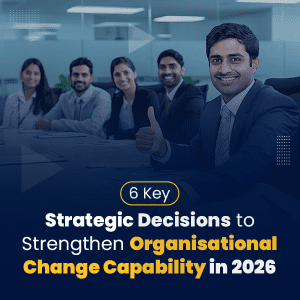
Businesses and organisations are constantly evolving, driven by a myriad of influencing factors. Staying updated on change management trends is essential for staying competitive and prepared for the future.
This blog post will explore the key change management trends of 2024, highlighting the strategies, technologies, and approaches that will shape how organisations navigate change in the coming months. This information is geared towards change management practitioners, business leaders, and anyone interested in the field of change management. Let’s dive in.
Understanding Change Management
Change management is a structured approach to transitioning individuals, teams, and organisations from their current state to a desired future state. This process involves planning, implementing, and monitoring changes to achieve organisational goals, enhance performance, and adapt to new circumstances.
Typical steps in change management include assessing the need for change, defining the scope, planning and organizing the initiative, engaging and communicating with stakeholders, implementing changes, and reinforcing new behaviors or processes. Whether driven by technological advancements, market shifts, or internal restructuring, change management aims to minimise resistance and ensure successful transitions.
Top 10 Change Management Trends for 2024
Here are the top ten trends organisations need to focus on to effectively implement change in 2024.
-
Embracing AI and Automation
Organisations are increasingly integrating AI tools and automation to analyze data, predict obstacles, and optimize decision-making during change initiatives. For example, AI can analyze employee sentiments and recommend personalized communication strategies, while automation handles repetitive tasks, freeing up human resources for more complex aspects of change.
-
Utilizing Advanced Analytics
Predictive analytics tools allow organisations to foresee potential challenges and make informed decisions. For instance, a retail company can use analytics to assess historical supplier performance and market demand, predicting bottlenecks and adjusting strategies accordingly.
-
Preparing for Economic Downturns
With predictions of a global economic downturn, organisations must proactively address restructuring, downsizing, and acquisitions. Transparent communication, support services, and skill development programs will be essential to navigate these challenges.
-
Data-Driven Decision Making
Data analytics empowers organisations to make informed strategic decisions. Leveraging data as a strategic asset enhances precision and agility in navigating change.
-
Integrating VR and AR
Virtual Reality (VR) and Augmented Reality (AR) are being used to enhance the change experience for employees. For example, a manufacturing company can use VR to simulate new production layouts, allowing employees to provide feedback before full implementation.
-
Focusing on Employee Well-Being
Organisations are recognizing the importance of supporting employees’ emotional and mental well-being during times of change. Providing mental health resources and skill development programs can ease transitions and foster a positive organisational culture.
-
Adopting Agile Methodologies
Agile principles, traditionally used in software development, are now being applied to change management. This approach involves breaking down change initiatives into smaller, iterative stages, fostering collaboration and flexibility.
-
Incorporating Sustainability Principles
Businesses are aligning change efforts with environmental, social, and governance (ESG) considerations. For example, a company might upgrade its processes for efficiency while implementing sustainable practices such as waste reduction and energy conservation.
-
Addressing Ethical Considerations
Organisations are ensuring that change initiatives align with ethical principles. This involves conducting assessments, involving stakeholders, and establishing guidelines for responsible practices, such as the use of AI.
-
Navigating a Globalized and Remote Work Environment
With the prevalence of remote work and globalization, change strategies must accommodate diverse and dispersed teams. This includes virtual meetings, multilingual documentation, and asynchronous communication tools.
Final Thoughts
As we look ahead to 2024, it’s evident that the business landscape is undergoing significant transformations. From leveraging AI in change management and fostering sustainability to addressing ethical considerations, these trends represent a shift towards more holistic and human-centric approaches to organisational change. At MARG, we closely believe in embracing these insights to help organisations view change as an opportunity for growth, innovation, and positive impact.
Let’s embrace the winds of change and navigate towards a future together, where adaptability and humanity drive success.






